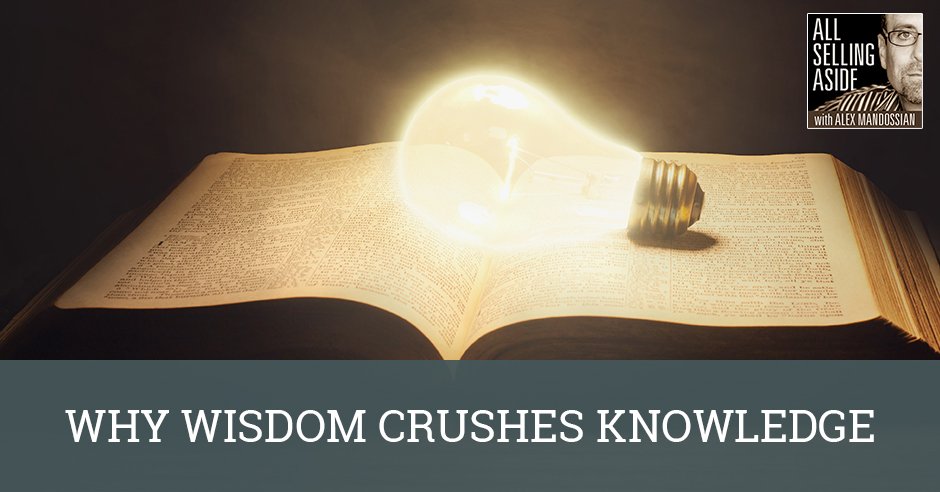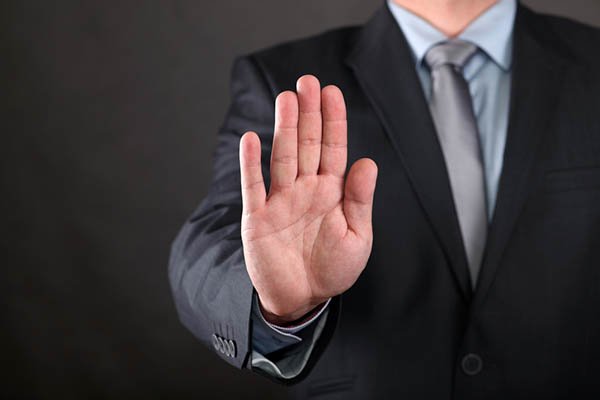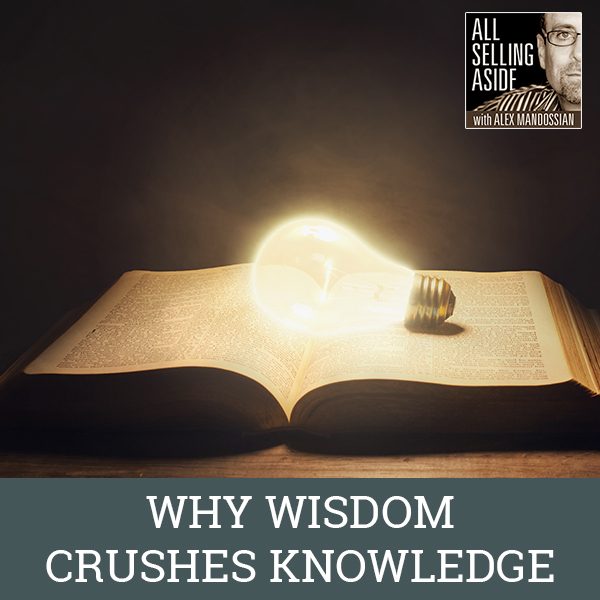
It is said that learning is a matter of gathering knowledge and wisdom is applying that knowledge. Alex looks into the striking difference between knowledge and wisdom and how that impacts ethical influence and your sales and income. Alex also introduces the concept of the complexity bell curve and the four levels of consciousness – unconscious incompetence, conscious incompetence, conscious competence, and unconscious competence.
Learn how wisdom trumps knowledge and why it requires understanding the complexity bell curve. When it comes to enrolling people, knowledge is not enough. Wisdom is what counts, and it doesn’t just take time but a lot of experience.
—
Listen to the podcast here:
Why Wisdom Crushes Knowledge
In this episode, you’ll learn three key insights which I believe are critical to making you a highly skilled ethical influencer. You’ll discover the striking difference between knowledge and wisdom and how that impacts ethical influence and your sales and income. It comes down to experience. You’ll also learn the insight of understanding the complexity bell curve.
The complexity bell curve looks like any bell curve like you would know in school, and it clarifies what simplicity on the far side of complexity looks like. You’ll learn the four levels of consciousness and how to get into a flow state faster, better and easier. I want you to lean in. I want you to read carefully because this episode could have a significant impact on how you can quickly and easily win the hearts of others.
If English is your second language, if you’re a student of mine from Brazil or Poland or if you’re from parts of Asia, then I hope you decide to read this and other episodes. If you re-read not once, not twice but three times, you will empower yourself to be more literate and even fluent in learning English as well as the art of ethical influence. That would mean much to me.
This is the story of Oliver Wendell Holmes, Jr. He is among the most famous of all US Supreme Court justices. He was born to a prominent Boston family and after graduating from Harvard Law School in 1866, he prepared a series of lectures that were published as The Common Law in 1881. He was prolific.
Holmes served on the Supreme Judicial Court of Massachusetts from 1882 until his appointment to the US Supreme Court in 1902 after the turn of the century. During his 30 years with the country’s highest court, he became known for his clear and present danger argument for the limitation of free speech and illustrated by a reference to a person’s falsely shouting fire in a theater. Look that up on Google. Look up Oliver Wendell Holmes, Jr. and his clear and present danger argument.
It’s not against the first amendment in the United States which is free speech. It’s something much more nuanced than that. His later development of this test coupled with his emphasis on the basically unregulated marketplace of ideas. He was seminal which means the top of the food chain for the development of modern free speech law.
His retirement in 1932 after the start of The Great Depression was a national event and he has remained along with John Marshall, another justice among the best known of all those who have served the Supreme Court. He is quoted a lot and he was a scholar. My favorite quote of Oliver Wendell Holmes is, “I would not give a fig for the simplicity on this side of complexity, but I would give my life for the simplicity on the other side of complexity.”
The Complexity Bell Curve
What does that mean? Many people read that quote and they shrug their shoulders, raise their eyebrows and it goes over their head like water off a duck’s back. You think about complexity being a bell curve and you think about a Y and X axis. If you don’t recall from school, the Y axis goes north and south on a graph and the X-axis goes east and west. If you were to look at complexity on the Y axis going up, the farther up you go, the more complexity there is.
You look at experience on the X axis, not time like I used to think. The more experience you have during whatever a compressed time frame you have on earth, that’s going from left to right or west to east on the X-axis. More experience means you’re going much farther to the right. Imagine a bell curve. You start with low complexity when you’re born. You get some knowledge, you learn how to crawl then walk then run then skip, and you get practical knowledge at school.

Wisdom: Don’t sell things to populations who are culturally not open to what it is that you have to sell.
You learn to memorize things such as history which is defined by civilizations who won wars. Imagine a bell curve. Like in school, it goes up and it goes back down over the course of your experience. Let’s say you have 100 units of experience from west to east or left to right. Let’s say you have 100 units of complexity going from south to north where X and Y meet all the way to the top.
Imagine that you start at a few units of complexity. It goes up almost like hockey stick growth, and then at its apex at the summit, it goes back down, let’s say at 60 or 70 units of experience. I thought the experience used to be time. I thought it came with age, but I know people who are younger than me that have more wisdom than I do.
I changed my mind, and I always knew that complexity would be on the Y axis and simplicity on this side of complexity or the near side of complexity is knowledge. Certain things like don’t put your hand on a hot stove lid, don’t try to sell people who don’t buy the stuff that you sell. In other words, don’t sell hamburgers to vegetarians. Don’t sell things to populations who are culturally not open to what it is that you have to sell.
If there’s a culture that does not go online, then selling digital marketing courses is not going to make sense. Maybe selling ice cubes to Eskimos, that wouldn’t make sense either. If you look at complexity as a bell curve, then it’s going up. The near side of complexity is called knowledge. Knowledge is important to apply, and it gets more complex. It happens with the school.
You go through grade school, secondary school, high school, college and graduate school if you go that far and maybe you get a doctorate. It gets more complex. You’ll learn more and every certificate means more time, more hours and more sleepless nights, more debt in paying back your bills if you’re not independently wealthy. Over time and experience, you end up having the complexity curve die back down.
It looks like a bell and it comes back down almost to the level like the ark of life to where you were as a kid. In your senior years, let’s say the ‘60s, ‘70s, ‘80s, you have the same level of simplicity as you did before at the age of ten. Life is simple at that age. It’s not complex. You probably don’t have kids to take care of in the home. You probably don’t have as many responsibilities. Some of your friends have passed on. Maybe your spouse and friends have passed on.
Wisdom Versus Knowledge
Life is a lot simpler, but it’s not knowledge on the far side of that complexity bell curve. It is wisdom. Knowledge is to be good to people. Wisdom would be what John Lennon was known for saying and it was my high school yearbook quote, “Love is all you need.” I don’t want to get too woo-woo or teary-eyed on you but think about wisdom versus knowledge. Knowledge is near side and wisdom is far side.
Oliver Wendell Holmes, Jr. was the most quoted Supreme Court justice in the United States’ history. He was born a day before my birthday, so I have an affinity toward him. He was born on the 8th of March. I was born on the 9th of March. He was born over 120 years before I was in 1841. I was born in 1964, and he died on March 5, 1935.
Like Bill Gates, Steve Jobs, JK Rowling of the Harry Potter books, Elon Musk, Oprah Winfrey, Mahatma Gandhi or Mother Teresa, anyone with a wealth of knowledge. We know that it’s wisdom that counts. It’s wisdom that we seek. Wisdom is why we have mentors, and there is a striking difference between knowledge and wisdom. The way you get it with ethical influence is you do the work. You look at objections and objection countering phrases that people have.
Seeding through storytelling is the new selling. Share on XYou look at trial closes and you say them, you write them. It’s about writing great sales copy and copying word for word by hand with a pencil or a pen of the world’s greatest copywriter. You can think like them, feel like them and you’re acting like them not in the first draft but in the final draft. That is ethically influencing you. I remember hearing Frank Kern say this one time, but he had a great course where I was one of the top affiliates called Mind Control.
Many people thought over the years that Mind Control was about like the CIA, the NSA or the deep-state thing. You’re controlling other minds. I remember Frank standing up. Frank and I go back several years. I remember he got in trouble one time by the FTC and they used him as an example. A lot of people jumped ship. I couldn’t believe it. Friends of his left and I remember faxing him so there couldn’t be a trace.
I wouldn’t email him. I would fax him, and my good friend Joe Sugarman had gone through a similar thing with the FTC with a famous senator. Joe is a good friend of mine. He was giving me advice, and I was faxing that advice over to Frank. Eventually, he got out of the doghouse and he got back on his feet. He’s one of the great digital marketers and marketing minds living now and I’m proud to call him my friend. We don’t talk nearly enough.
What I remember is when he came back, we did a teleseminar and he wanted me to be the host of that. I believe what Frank got through that experience, and if you haven’t heard of Frank Kern, you can look him up. Frank, if you’re reading, a tip of the hat to you, I’ve learned much from you what to do and what not to do. I saw in Frank as he went from knowledge to wisdom.
Experience is not the best teacher as you learned from a previous episode. Experience is the only teacher and with experience comes wisdom. The more experience you have, the more wisdom you have. A young child Buddha has a lot of experience. In the Buddhist tradition, it’s through many lives prior to the one he’s living. If you look at the complexity bell curve, understanding that bell curve and why simplicity clarifies so much, then the X-axis is experience, not time.
The Y axis going up and down is complexity. The bell curve goes up and down. Knowledge is on the near side, wisdom is on the far side, and that simple graph can teach you so much on how to influence others ethically. You’ve got to get in and do it. When I am training sales teams, I role-play with them on video so they can see themselves and they can go through the process.
I go through four different personas that are taught to me by the Myers-Briggs champions. There are sixteen different personas but the light version that I’ve learned over the years is four. Sometimes I’m competitive, other times I’m spontaneous, yet other times I’m methodical. Other times I’m humanistic, and I want the salesperson to adapt to who I am because it’s not only what they’re saying, but it’s how they’re saying to who I am.
I don’t teach people what to think. I teach them how to think about what they’re thinking about because it’s how that always takes them out. This is another how. Think about the complexity bell curve. Think about what you can do to become a better ethical influencer when you start to sell.
People don’t like to sell in my experience. There’s rejection. There’s anticipated rejection which is even worse. There are self-esteem issues and self-worth issues. There’s the income that comes with self-esteem and self-worth.

Wisdom: Don’t seek the sale; that’s the wrong target. When you’re selling and you’re starting out, seek the objections.
They can be terrible, and many people decide not to sell. They creatively avoid. They procrastinate or they’re a perfectionist and they never finish their sales script. They end up not interacting with people. If you go to the experience of interacting and the best salespeople I know are door-to-door salespeople.
Werner Erhard was a door-to-door salesperson. Gary Hubbard was a door-to-door salesperson. Dan Kennedy was an Amway salesperson. These people have a lot of interactions not with enrolling people and influencing them but with rejection and how to deal with it.
The same goes through with Jim Rohn. The same goes and rings through with Zig Ziglar. Jim Rohn was with Herbalife, one of the great distributors of that network marketing company. The more you have contact with human beings, the more you learn how to adapt and through adaptation comes wisdom.
The more screenplays you see, the more wisdom you gain as a screenplay consultant. The more scripts you see or video, the better you become. You experience them. I tell my salespeople to go out there and don’t try to sell anyone. In fact, if you enroll someone, you’re fired. They look at me and they laugh, and I go, “I’m not kidding. I want you to go out and find the key objections.”
“Don’t seek to sale. That’s the wrong target when you’re selling and you’re starting out. Seek the objections so that you can come back and you can tell me what the key objections were. We can debrief with the entire sales team on how to overturn those objections as if the objections are a lock on a door.” The key the team makes as a collective locksmith.
We make the key to open that one door, and you’ve got to create another key to open another locked door and then you had another locked door. There are somewhere between five to nine objections that stand in the way between you and a yes and a sale. An objection is a buying signal, and as my friend, Jeffrey Gitomer would say, “If you don’t get an objection there’s no interest, there’s no engagement.” It’s a good thing.
Rather than argue, align. Tell a story. Seeding through storytelling is the new selling. That’s the premise of this show. The goal of this episode is to tell you that when it comes to enrolling people, knowledge is not enough. Wisdom is what counts, and wisdom requires experience and understanding the complexity bell curve and why simplicity will clarify and accumulate your wealth is the key.
Copywriting the best ad, copying them makes you think and feel like a world class copywriter. Speaking the best speeches, whether it’s a JFK speech, a Dr. Martin Luther King speech or a speech by a spiritual leader like Jesus. Maybe it’s a Lincoln speech, the Gettysburg Address or the Blood, Sweat and Tears speech by Winston Churchill.
Maybe it’s reading The Declaration of Independence which is the greatest lead generation out of all-time by Thomas Jefferson, whatever. Maybe even The Ten Commandments. It’s not about the type of speech it is. As long as it impacted people, if you say it and it comes through your nervous system, you’re thinking it, you’re feeling it, you’re acting it and you may get the same result.
The more experience you have, the more wisdom you have. Share on XBy modeling the same thoughts, feelings and actions, you get the same results. It forces your thoughts and feelings into greatness by modeling. I don’t like to write my way into greatness. I like to copy write my way into greatness. For half an hour a day, sometimes an hour a day when I’m traveling, I write word-for-word great ads. By writing it, I’m thinking, feeling and acting like that copywriter in his final version. The Alexism for this episode is there’s no such thing as a self-made success.
Every entrepreneur, every business owner requires a mentor to clear their path to wild success and greatness. Warren Buffett had Benjamin Graham. Warren Buffett’s first investment and he persuaded Benjamin Graham to do this was GEICO. I have GEICO insurance for my car to pay homage to Warren Buffett, that was his first investment. You have Steve Jobs who had Andy Grove as a mentor. Maya Angelou arguably was Oprah Winfrey’s mentor.
The Four Levels Of Consciousness
Socrates mentored Plato. Plato mentored Aristotle. Aristotle mentored Alexander the Great. These thoughts, feelings, actions and results, the manifestation process that my good friend T. Harv Eker has taught many years. That is accelerated through mentorship and that brings me to the final insight, the four levels of consciousness and how to get into a flow state. When you get into the flow, then you sell without thinking. You influence ethically without thinking.
Level one, at the bottom, is sheer ignorance. It’s called unconscious incompetence. It’s a blind spot. You don’t know that you don’t know. There is a concept called the Johari Window. You want to reduce your blind spot because sheer ignorance means there’s no way you can learn. You’re unconsciously incompetent.
Level two is conscious incompetence. That’s the beginning of learning. That’s a good thing. That is being conscious of your incompetence like learning a new language. You’re not literate yet. You’re surely not fluent, but if you immerse yourself like going to Sao Paolo, Brazil and I want to learn Portuguese, I could learn it in a year. If I’m immersed and all I’m talking is Portuguese. I can take an accelerated route at a center in Utah where people go when they’re going on their mission.
I’ve got many friends who are Mormon and of a spiritual calling and they’ve gone into many different countries. They learn a new language in three months. My good friend, Ryan Levesque, learned Mandarin quickly by immersing himself. Conscious incompetence is a great place to be because it’s the humility of knowing that you’re about to learn. It’s learning to learn.
The third level which is one step higher is conscious competence, and that’s literacy. You’re literate at it. You’re a great coach if you’re literate. You may not be a great athlete. You’re not in the flow of a Michael Jordan, LeBron James, Steph Curry or any other athlete. I prefer basketball. A Lionel Messi for soccer or football as they call it outside of North America.
Conscious competence is you’re literate at this thing and you can be a coach. The highest level, the flow state is unconscious competence. That’s fluency. You don’t even think about it, you’re fluent. You’re not thinking of the words if you’re learning a new language.
You’re not thinking of the move if you’re about to take a basketball three-point shot or a layup. You’re in flow, unconsciously competent. The hardest thing in the world is to be able to be in flow as I have in two sports, squash and cycling, and then I have to come back down a step to conscious competence which is a sacrifice to the literacy state where it’s more analog.

Wisdom: There is no such thing as a self-made success. Every entrepreneur requires a mentor to clear their path to wild success and greatness.
It’s not digital and you need to teach it. Few coaches are able to be fluent. They can teach coaching, they can teach sales, but they can’t do it as well as the people who are in flow, who are completely fluent. Literacy and fluency are two different things.
Steve Kerr, who was on the second winningest team of all time, the Chicago Bulls when Michael Jordan was playing, has the highest three-point percentage of all time as a player. I believe he’s the greatest coach coaching in the NBA of the Golden State Warriors. I have a bias because I live in the San Francisco Bay Area, but few coaches are that good. A few more come to mind.
Knowledge is level three; that’s conscious competence. Wisdom is level four. If this episode was a little heady for you, I don’t apologize. It’s important to know the four levels of consciousness and to get into a flow state.
Unconscious incompetence is what you want to get out of, that’s being ignorant. Once you get red pilled, you’re consciously incompetent whereas learning. You become literate, consciously competent and then unconsciously competent when you’re fluent.
Remember, knowledge, near side of complexity is level three. Wisdom, far side according to Oliver Wendell Holmes, Jr. is level four.
A review of the insights you and I discovered in this episode is the difference between knowledge and wisdom. It doesn’t take time. It takes experience. Right now and right here, you can do whatever it takes to learn how to influence others in your market niche ethically. No matter what business you’re in, you have to influence someone, a parent, a grandparent, a friend, a spouse, a child, a boss or a staff member.
Next, simplicity on the near side of complexity, we call that knowledge. That’s important but when you apply it and you experience it at such a high level where you go onto the far side of complexity and the bell curve comes down, that’s called wisdom and life becomes a lot simpler. The four levels of consciousness are unconscious incompetence, conscious incompetence, conscious competence and unconscious competence.
Conscious competence is knowledge. Unconscious competence is wisdom, and one of the greatest sacrifices is to be able to get to level four, unconscious competence. Sacrifice and go down to level three which is conscious competence, which I have to be right here and right now in teaching you during this episode.
These insights can only work for you if you work them. Speaking of reviews, I hope this isn’t the first you’ll read to but if it is, I want you to go to AllSellingAside.com/iTunes and type in your biggest takeaway. Type in your biggest a-ha moment you experienced from this episode.
You can do it in the review section. iTunes will ask you to rate the episode. I hope I’ve earned five stars. If you’ve already done this, write it on an index card. Take a few minutes out of your day and declare it to the rest of the world. It means a lot to me and it has a lot to do with getting this podcast and episode at the top of the food chain.
As a final gift to you, in honor of this 25th episode of the show, it’s a complimentary version of my book, Alexisms: Useful Lessons from a Recovering Serial Entrepreneur. You can instantly download it for free at AlexismsBook.com. You can pay for it on Amazon. Be my guest to do it there via Kindle or the softcover version. You can get the digital version as a result and in honor of this episode.
That does it for this episode. I do hope our paths cross again next time for All Selling Aside. This is the show dedicated to making an ethical influence within your reach so that you can achieve and even exceed your sales potential. I do it as public service, several years of sales and marketing know-how.
Do whatever it takes to join me next episode because our topic will be The Self-Serving Benevolence Principle. That is not an oxymoron. I can’t wait for you to join us. It is all about Karmic marketing. It is not woo-woo. It’s about cause and effect and it is responsible for Warren Buffett buying a company for $0.25 billion.
Stay tuned for that story next episode for the show. I encourage you to invite a friend or a family member. Bring a study buddy. Studying with someone else whether English is your primary or secondary language, it is much more fun because experience is the only teacher. I can’t wait to connect with you.
Important Links:
- The Common Law
- Frank Kern
- Joe Sugarman
- Episode – All Selling Aside episode 11
- Myers-Briggs
- Werner Erhard
- Dan Kennedy
- Herbalife
- Jeffrey Gitomer
- GEICO
- Harv Eker
- Ryan Levesque
- AllSellingAside.com/iTunes
- AlexismsBook.com
- Amazon – Alexisms: Useful Lessons from a Recovering Serial Entrepreneur




